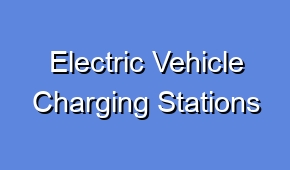Electric Vehicle Charging Stations

Electric vehicle charging stations provide a convenient and efficient way for electric car owners to recharge their vehicles. These stations are equipped with charging equipment that allows drivers to replenish their vehicle’s battery while on the go. With the increasing popularity of electric vehicles, charging stations are becoming more widely available, making it easier for drivers to find a charging point and reduce their reliance on traditional petrol stations.
Electric Vehicle Charging Stations are essential for the growing number of electric vehicles on the road. As the demand for EV charging stations increases, it is crucial to have a reliable and accessible infrastructure in place. Electric vehicle charging is a convenient and eco-friendly option for drivers, reducing their carbon footprint. With EV charging stations strategically located, drivers can easily find a place to charge their vehicles, ensuring they have enough power for their journeys. These charging stations also provide an opportunity for businesses to attract customers, as they can offer EV charging services as an added convenience. Investing in EV charging infrastructure is a forward-thinking move that promotes sustainable transportation.
| Electric Vehicle Charging Stations: |
| 1. Electric vehicle charging stations provide convenient access for EV owners to recharge their vehicles. |
| 2. Charging stations are typically found in public areas, parking lots, and alongside highways. |
| 3. EV charging stations use different levels of charging speeds, from Level 1 to DC fast charging. |
| 4. Level 1 charging stations use a standard household outlet, while Level 2 stations require dedicated equipment. |
| 5. DC fast charging stations can charge an electric vehicle significantly faster than other types. |
- Electric Vehicle Charging Stations:
- 6. Some charging stations are equipped with multiple connectors to accommodate different vehicle types.
- 7. Charging station networks allow users to monitor and manage their charging sessions remotely.
- 8. Many charging stations offer payment options such as credit cards or mobile apps.
- 9. Charging stations can be categorized into public, workplace, residential, and destination charging.
- 10. Government incentives and rebates are often available to encourage the installation of charging stations.
How do electric vehicle charging stations work?
Electric vehicle charging stations supply electricity to recharge electric vehicles. They typically consist of a charging unit, connector, and power source. The charging unit converts AC power from the grid into DC power suitable for charging the vehicle’s battery. The connector allows the vehicle to be plugged into the charging unit. Electric vehicle charging stations can be found in various locations, such as homes, workplaces, public parking lots, and along highways.
What types of electric vehicle charging stations are available?
There are three main types of electric vehicle charging stations: Level 1, Level 2, and DC Fast Charging. Level 1 charging stations use a standard 120-volt household outlet and provide a slow charging rate. Level 2 charging stations require a 240-volt power source and offer a faster charging rate. DC Fast Charging stations provide the fastest charging speed and are typically found along highways for long-distance travel.
How long does it take to charge an electric vehicle at a charging station?
The charging time for an electric vehicle depends on various factors, including the vehicle’s battery capacity, charging station type, and the charging level. Level 1 charging can take anywhere from 8 to 20 hours, while Level 2 charging typically takes 4 to 8 hours. DC Fast Charging stations can charge a vehicle to 80% in around 30 minutes. However, it’s important to note that charging times may vary depending on the specific vehicle and charging station capabilities.
Can I charge an electric vehicle at home?
Yes, electric vehicles can be charged at home using a Level 1 or Level 2 charging station. Level 1 charging stations can be plugged into a standard household outlet, while Level 2 charging stations require a dedicated 240-volt power source. Home charging provides convenience and allows for overnight charging, ensuring the vehicle is ready for use in the morning. It’s recommended to hire a professional electrician to install the necessary charging equipment.
Where can I find electric vehicle charging stations?
Electric vehicle charging stations can be found in various locations, including public parking lots, shopping centers, workplaces, and along highways. Many charging stations can be located using online maps or smartphone applications specifically designed for electric vehicle charging. Additionally, some electric vehicle manufacturers provide information about nearby charging stations through their vehicle’s navigation systems.
How much does it cost to charge an electric vehicle at a charging station?
The cost of charging an electric vehicle at a charging station can vary depending on several factors. Some charging stations offer free charging, while others require payment. Payment methods may include pay-per-use, subscription plans, or charging network memberships. The cost per kilowatt-hour (kWh) of electricity can also vary. It’s important to check the pricing details of the specific charging station or charging network before use.
Are electric vehicle charging stations compatible with all electric vehicles?
Most electric vehicle charging stations are compatible with all electric vehicles that use the standard charging connectors. However, it’s essential to ensure the charging station has the appropriate connector for your specific vehicle. Common connectors include the SAE J1772 for Level 1 and Level 2 charging, and CHAdeMO or CCS for DC Fast Charging. Some vehicles may require an adapter to connect to certain charging stations.
Can electric vehicle charging stations charge multiple vehicles at once?
Yes, some electric vehicle charging stations are equipped with multiple charging ports, allowing multiple vehicles to charge simultaneously. These stations are commonly found in public parking lots or other high-demand areas. However, it’s important to note that the charging speed may be divided among the connected vehicles, resulting in slower charging times for each vehicle.
What are the benefits of using electric vehicle charging stations?
Using electric vehicle charging stations offers several benefits. They provide a convenient and accessible way to recharge electric vehicles, allowing for extended driving range. Charging stations also contribute to reducing greenhouse gas emissions and dependence on fossil fuels. Additionally, some charging stations offer amenities such as reserved parking spots or rewards programs for electric vehicle owners.
Can I use a regular power outlet to charge my electric vehicle?
While Level 1 charging stations can be plugged into a standard household outlet, it’s important to note that they provide a slower charging rate. Regular power outlets may not be able to handle the higher power demands of Level 2 or DC Fast Charging stations. It’s recommended to use the appropriate charging equipment and consult with a professional electrician for safe and efficient charging.
What safety measures are in place at electric vehicle charging stations?
Electric vehicle charging stations are designed with safety features to ensure the secure operation of the charging process. These may include ground fault protection, overcurrent protection, and automatic shutdown in case of emergencies. Additionally, some charging stations have built-in authentication systems to prevent unauthorized access. It’s important to follow the recommended safety guidelines and instructions provided by the charging station manufacturer.
Can electric vehicle charging stations be powered by renewable energy sources?
Yes, electric vehicle charging stations can be powered by renewable energy sources such as solar or wind. Many charging stations are equipped with solar panels or are connected to renewable energy grids. Charging vehicles with renewable energy helps reduce carbon emissions and promotes sustainability. Some charging stations even offer options to track the amount of renewable energy used during the charging process.
Do electric vehicle charging stations have different power levels?
Yes, electric vehicle charging stations have different power levels, which affect the charging speed. Level 1 charging stations provide the slowest charging rate, Level 2 provides a faster rate, and DC Fast Charging stations offer the fastest charging speed. The power level is determined by the charging unit’s electrical capacity, typically measured in kilowatts (kW).
Can I reserve a charging spot at an electric vehicle charging station?
Some electric vehicle charging stations offer the option to reserve a charging spot in advance. This can be convenient, especially in high-demand areas or during peak charging times. Reserving a spot ensures availability and allows for efficient planning. Reservation methods may vary, with some stations offering online booking systems or smartphone applications for reservation purposes.
Are there any government incentives for installing electric vehicle charging stations?
Many governments provide incentives, grants, or tax credits to encourage the installation of electric vehicle charging stations. These incentives aim to promote the adoption of electric vehicles and support the development of charging infrastructure. The specific incentives available may vary by region or country. It’s recommended to check with local authorities or energy departments for information on available incentives.
What maintenance is required for electric vehicle charging stations?
Electric vehicle charging stations generally require minimal maintenance. Regular inspections to ensure proper functioning, cleanliness, and safety are recommended. Charging connectors may need occasional cleaning or replacement if damaged. It’s important to follow the manufacturer’s guidelines for maintenance and consult with professionals for any necessary repairs or upgrades.
Can I use a charging station from a different manufacturer for my electric vehicle?
Most electric vehicles can use charging stations from different manufacturers as long as they have compatible connectors. However, it’s essential to check the compatibility of the charging station with your vehicle’s connector type. Some charging stations may require adapters to accommodate different connector standards. It’s recommended to consult the vehicle’s manual or contact the charging station manufacturer for compatibility information.
What happens if my electric vehicle runs out of charge at a charging station?
If your electric vehicle runs out of charge at a charging station, you will need to contact a towing service to transport your vehicle to a nearby charging station or a suitable location for charging. It’s important to plan your trips and monitor the battery level to avoid running out of charge. Many electric vehicles also provide range estimations and alerts to help drivers manage their battery levels effectively.
Are there any mobile apps or platforms to locate electric vehicle charging stations?
Yes, there are various mobile apps and platforms available to locate electric vehicle charging stations. These apps provide real-time information on nearby charging stations, availability, pricing, and charging speed. Some popular apps include PlugShare, ChargePoint, and Electrify America. These apps also allow users to plan routes, reserve charging spots, and monitor charging progress.





















